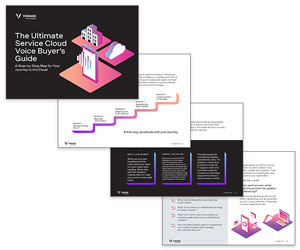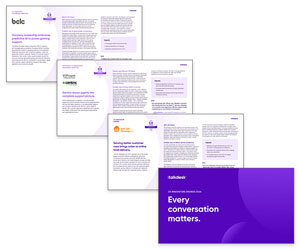Our panel of experts share their predictions on the future of smarter ways of working.
What can we expect in the next few years?
Artificial Intelligence (AI) will speed up the identity verification process

Richard Brown
The emergence of Artificial Intelligence (AI) is already impacting interactive voice response (IVR) interactions in a positive way, as it enables customer service agents to anticipate why a customer is calling before exchanging a word.
This is likely to speed up the identity verification process, as AI can reduce the interaction time due to the multiple verification steps required to prevent fraud.
AI can also provide an extra layer of customer protection, making the agent’s work more efficient, less repetitive and more secure.
With thanks to Richard Brown at Interactive Intelligence
Smart Data (in place of Big Data) will reduce customer effort
As big data becomes smart data, the massive amount of information we now have about customers will be used as an integrated, personalised, predictive set of insights.
Data reflecting the entire customer journey will also be brought to bear at decisive moments, regardless of channel. This will be a game-changing tool for issue resolution and offer matching, while reducing customer effort.
Deep learning will let us model customer behaviours more precisely
Cognitive systems will replace the first-generation decisioning and predictive processes used today, as it applies both to customer behaviour and agent performance.
Deep-learning approaches will let us more precisely model customer behaviours and intents, and to meet customer needs with “one-to-moment” personalisation.

Erik Strand
Agents will have similar behavioural, skills-based and performance models, and will be automatically paired with the customers they can best serve.
Multivariate testing will become business-as-usual
Multivariate testing that is largely done today by hand or intuition, or not at all, will become a business-as-usual part of the engagement optimisation process.
This will be handled by back-end cognitive systems.
With thanks to Erik Strand at CallMiner
Customers and contact centres will finally embrace video customer service
We read on a daily basis that we need to be connecting with our customers on whatever platform they use.
Meanwhile, more and more people are using video calls. Friends talk to each other via face-to-face video calls (FaceTime, Skype, etc.), and we are regularly using video conferencing during the working day.
There were arguments in the past that customers might be uncomfortable with video interactions, but we believe this community will be using video for customer service in the near future.
The upside of video interactions for customer service teams is that brands will be able to build rapport with their customers like never before.
With thanks to Brian Griffin at Scorebuddy
Communication will be initiated with customers in their preferred channel
The focus of contact centres will move towards providing a more personalised and bespoke approach to each individual customer.
They will be able to build a picture of how each person normally carries out business – for example, via live chat, social media, or email – and will initiate communication with customers in their preferred manner.
With thanks to Martyn King at Nexbridge
There will be a rise of super agents as subject experts
Increasingly, more straightforward queries are being managed via self-help, webchat or social media – and call centre agents are turning into super agents.

Nigel Dunn
Super agents will have a telephone-intense role, allowing them to build rapport with the customer. Conversations will predominately be longer and more in-depth.
As each enquiry will be bespoke to the individual customer’s needs, there will be less reliance on scripts and standard Q&As and more of a free-flow discussion.
Omnichannel customer service will become more prevalent
There will be a convergence of customer service channels as customers demand quicker responses via a variety of methods, leading to a greater prevalence of omnichannel customer service.
This will require agents to upskill to use all platforms – and will help them to successfully resolve a case quickly and efficiently and to communicate with the customer by their preferred method.
With thanks to Nigel Dunn at Jabra

Susannah Richardson
Self-service will become more integrated with contact centre processes
Contact centres will become smarter by integrating self-service into their processes rather than it being driven by other parts of the business. This will allow them to maximise on efficiency and real-time response rates.
Some solutions already provide a filter feature for companies so that simple enquiries, such as status checks, FAQs and rescheduling, can be dealt with by automation – while passing on more complex issues to be dealt with by an agent.
With thanks to Susannah Richardson at mplsystems
The move to automation will gather pace
Robotic technology is already driving many contact centre applications, from auto agents, to machines reading texts, to speech recognition – and that trend is only likely to gather pace.
This capability is increasingly freeing up human agents to concentrate on more complex interactions with the highest-value customers.
More field service engineers will be using mobile location-based services
We expect to see a greater prevalence of field service engineers using mobile location-based services to identify their position.
This data can then be tied with other connected device-driven applications to build an enhanced customer service offering.
As an example, a fault with a fridge freezer might be identified by direct machine-to-machine interaction between the device and the operator company.

Jeremy Payne
The system could then be extended to pinpoint an engineer in the area, identify whether they are free and then schedule an appointment at their earliest convenience.
Conversation analytics will be used to capture the voice of customer
Voice biometrics is an application that we expect to see increasingly used in the banking and financial services sector.
This will become part of a wider customer service proposition where conversation analytics can be used to capture the voice of the customer and help pinpoint sales opportunities, to rate customer satisfaction and drive trend prediction, for example.
With thanks to Jeremy Payne at Enghouse Interactive
Technologies are already on the market that support smarter working
While developments on the horizon are exciting, there are a number of solutions available that are already beginning to support smarter working, such as:
Cloud-based solutions – Cloud-based solutions can be cost effective to integrate with existing contact centre infrastructure, enabling organisations to access the latest functions and features that support smarter working.
For example, the latest generation of answering machine detection (AMD) technology can help reduce wasted outbound activity, and the intelligent routing of calls can match the agent to the caller.
Speech analytics technology – The latest advances in speech analytics technology make it possible to identify key words and phrases that should be used. It can also ensure that agents are keeping to predefined scripts, and measure the amount of “unproductive” silence in a call.
With thanks to Derwyn Jones at UItracomms
What can we expect to see by 2025?
The contact centre will be reconceived as a customer engagement platform
Smart data and cognitive systems will be brought together as the contact centre is reconceived as a customer engagement platform, whose fundamental interaction will be high-quality matches of customer issues and their successful resolutions.
Human-to-human interactions will become rarer, but more valuable, and even these will be assisted by machines monitoring conversations in real time.
Existing platforms like Facebook, Viv, and Google Now will be the first to recast the contact centre in this light, but we will also see new platforms purpose-built for customer engagement.
These platforms will create a smarter marketplace for issues and resolutions to be efficiently matched, resulting in highly optimised and low-effort experiences for the customer and positive outcomes for the contact centre.
With thanks to Erik Strand at CallMiner
Artificial Intelligence will be far more capable than it is today
Artificial intelligence will be far richer and more capable than it is today.
With this, the role of the customer service agent will change significantly. They will have more knowledge and technology power at their fingertips.
…And customers will be even more demanding
But at the same time, customer demands will grow dramatically. It is likely that they will be especially unhappy at being asked questions that they know the business could have accessed by tapping into their own Internet-of-Things-connected device.
The subscriptions revolution will continue to gather pace
The subscriptions revolution continues to gather pace as more and more customers switch to an operating model based on recurring revenues.
Organisations will increasingly need to find better ways of harnessing feedback from the customer and using that to improve their service. We also expect to see companies starting to augment their sales proposition.
It will also become a lot easier for businesses to effectively sell other companies’ products and create a different kind of proposition from the one they have today.
With thanks to Jeremy Payne at Enghouse Interactive
Big data will provide useful, pre-emptive information to customers
Big data will provide contact centres with a way to understand the expectations of their customer-base. This will enable clients to contact the right advisory team via their preferred method, or will reroute the call to the agent best placed to manage the customer’s needs.
It could even provide useful, pre-emptive information to customers if seasonality, weather, political or social changes have had an effect on an organisation’s product or service, leading to increased technical support demand.
Remote working will become the norm and help reduce staff attrition
Cloud-based contact centres and unified communication will facilitate remote working. Mobile communications will also support remote working, with call centre specialist apps aiding increased customer satisfaction and agent efficiency.
Wireless headsets will become more popular for this new breed of agents, as they no longer have to be located at their desk or have DECT density issues (often found in a large, open-plan offices with wireless devices).
Remote working will also support a reduction in staff attrition and sick leave – two recent problems facing the call centre industry – as agents find more job satisfaction and general workplace happiness.
With thanks to Nigel Dunn at Jabra
The Internet of Things (IoT) will enable proactive customer service
The increasing development of the Internet of Things will transform contact centres, as the feed of information about a device’s status will enable businesses to provide proactive customer service.
Customers will also be considering inbuilt value-added packages more when buying products in the future, as they will come to expect a level of added service as standard.
Agents will also have to become more trained in complex issues, as simple issues are automatically resolved. However, as calls will be triggered proactively, they can be made by ‘expert’ agents trained specifically in one area of technical proficiency.
With thanks to Martyn King at Nexbridge
Artificial Intelligence (AI) will be used to identify peak periods of calls
AI won’t be limited to customer-facing interactions, as it can also be used to sift through massive amounts of data to identify trends. Examples include the use of AI for pattern prediction, which could be beneficial for identifying peak periods of calls.
This is of particular importance for the development of an efficient omnichannel strategy, which would address customers’ communication channel preferences for interacting with an agent, as AI can analyse and predict what channel the customer is likely to use.
With thanks to Richard Brown at Interactive Intelligence
Are you already using some of these smarter ways of working in your contact centre? Do you agree with these predictions for next-generation technology?
Put your thoughts in an email to Call Centre Helper.
Author: Megan Jones
Published On: 27th Sep 2016 - Last modified: 18th Oct 2024
Read more about - Technology, Artificial Intelligence, Automation, CallMiner, Cloud, Editor's Picks, Enghouse Interactive, Future, Genesys, IFS, Jabra, Jeremy Payne, Nexbridge, Scorebuddy, Self Service, Susannah Richardson, Ultra, Video Solutions








































